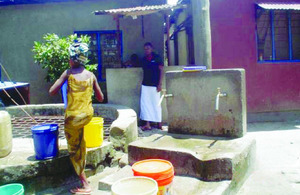DFID Research: Providing better access to water in urban settlement
This project aimed to improve the well-being of the poor in informal urban settlements through cost-effective local water supply services.

A water kiosk in Dar es Salaam
The pace of urbanisation is exceeding the ability of many water utilities to provide services for new customers, or even to maintain standards for existing customers. In many cities of Africa, Asia and South America, more than half the population of towns and cities pay high prices to obtain their water services from suppliers other than the official water supply utility.
The project, Better access to water in informal urban settlements through support to Water-Providing Enterprises (SWEs) was lead by the Water, Engineering and Development Centre in association with the International institute for Environment and Development and Practical Action. It aimed to contribute to improving the livelihood of the poor in informal urban settlements through cost effective improved water supply services. The countries involved were Tanzania, Ghana, Kenya and Sudan.
Private enterprises, usually operated by small scale entrepreneurs, earn money from the sale of water, and are defined as Small Water Enterprises (SWEs). During Phase 1 of the project, local teams worked to identify constraints, opportunities and strategies for enabling SWEs to deliver acceptable water services to low income urban consumers. Kiosk operation is a form of SWE that has good potential for expansion, with the potential to provide improved services in terms of reduced cost, a more reliable water supply, and increased assurance of water quality.
A selection of the improvements identified in the two cities of Nairobi and Dar es Salaam were then tested during Phase 2 of the research project. Kiosks are most suitable close to existing distribution pipelines, where installation costs are low. The costs of laying and maintaining a connecting pipe to a kiosk increase with the distance from the nearest existing pipeline, and this may affect kiosks affordability. Where kiosks are considered an appropriate way of improving water services from SWEs, various physical, institutional and other components are necessary for the kiosks to operate successfully.
Findings showed that services provided by SWEs can be improved if there are changes in attitude by SWEs, utilities and governments, involving recognition of SWE activities by both utilities and governments. Improvement is likely to be gradual, as trusting relationships are developed between utility staff and SWEs.
The research shows that services provided by SWEs can be improved through guidance, and dialogue with utilities. Improvements in services delivered by SWEs are still likely to fall short of providing safe clean water for every home. However, improvements in SWE operating practices can not only make a critical difference, but can represent progress towards this long term goal.
SWEs, government, municipalities, utilities on a local level were targeted with in-country workshops. Conferences and regional workshops were held and publications were employed to reach regional agencies, utilities, researchers, policy advisers. On a national and international level, a web site and journal papers were used. The project included action research, encouraging dialogue between stakeholders, and encouraging them to identify acceptable working relationships. It investigated what market incentives exist for better water services, and how these can be realised. For many years SWEs has had an undeserved reputation of exploiting the poor, and selling unsafe water at high prices to vulnerable poor communities.
Those currently benefiting are the people living in some informal low income areas of Nairobi and Dar es Salaam. They have greater confidence in the quality of the water, better access to it, and at a lower cost than previously. Utilities can reduce the quantity of water lost through leaks and illegal connections, meet new demands, and collect payments for water sold from kiosks. Kiosk operators can earn a living, and other local SWEs can have better access to water of good quality. Communities may have benefited indirectly, with more money being retained in the local economy, through local trade and employment. The findings potentially have widespread significance, because the majority of the people living in many cities of Africa, Asia and South America obtain their water services from unofficial suppliers.